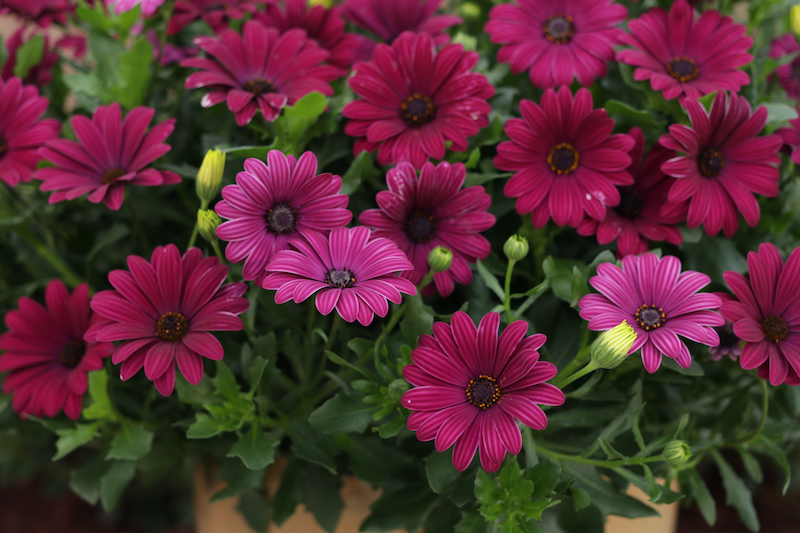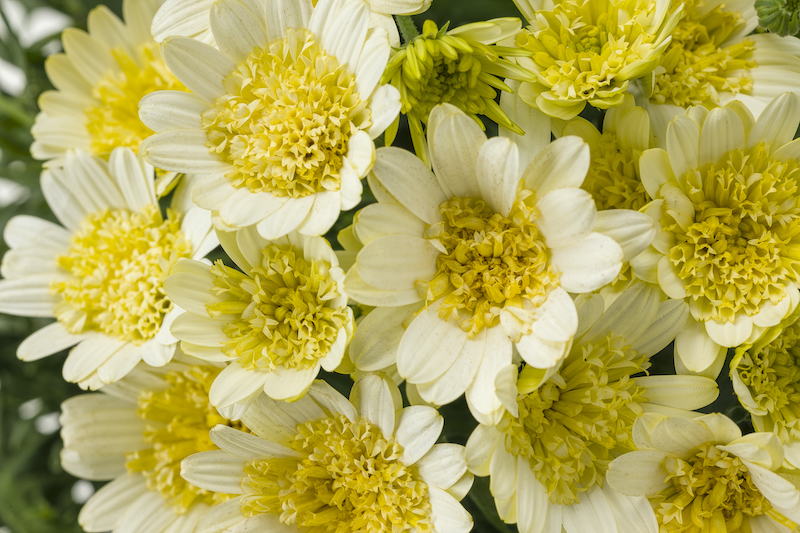Osteospermum is a plant that does not grow well in compact or poorly drained soils. African Daisy needs to have large amounts of nutrients to bloom throughout the growing season. Adopt a regular fertilization schedule up until the first frost of fall for best performance. African Daisy grown as a perennial will tolerate less feeding but will grow best with rich soil and a consistent fertilizing schedule.

How to Fertilize African Daisy
African Daisy prefers soil that is slightly acidic to neutral in pH. Fast-draining soils like rocky or sandy loam are their preferred texture. Heavy clay soils must be amended with organic compost to lighten the texture before planting. A layer of compost every year as mulch will change dense soils over time and add to the soil's nutrition. African Daisy will need feeding with a complete fertilizer at planting time. Look for formulations with a high P (Phosphorus) content in the N-P-K listing.
A 4-10-6 balance helps to support flowering while also providing food nutrients for foliage (Nitrogen) and root structure (Potassium). As the plants grow, regular feeding with liquid fertilizer will be needed every 2-3 weeks throughout the growing season. Plants growing in containers will need applications of diluted liquid fertilizer with the same formulation. Feed the soil every 1-2 weeks, depending on your watering schedule.

Best Time To Fertilize African Daisy
African Daisy needs consistent feeding to keep blooming all through the growing season. Garden-grown plants will thrive with a feeding every 2-3 weeks. Container-grown plants will need feeding every 1-2 weeks. Continue feeding all through the fall until the first frost if African Daisy is growing as an annual. African Daisies grown as a perennial need to be hardened off well before the cooler fall weather. Stop fertilizing these plants by the end of August. This will signal the plant to prepare for semi-dormancy over the winter.
Best Fertilizer For African Daisy
African Daisies will perform best with regular applications of a fertilizer formulated for flowering plants with a complete mix of the 3 macronutrients, Nitrogen, Phosphorous, and Potassium (K). An NPK ratio of 4-10-6 or 2-6-4 will support flowering and some foliage growth throughout the season. Granular feeds are best used on garden-planted African Daisies.
The fertilizer is spread over the root zone and gently scratched into the soil. Always water this type of fertilizer, so there is no chance of burning leaves or roots. Container-grown plants often respond better to liquid feeds, which dissolve in the soil to reach the roots faster. Apply this fertilizer in place of regular watering once every 1-2 weeks.
African Daisy Fertilizing Tips
- African Daisy prefers regular fertilizing to help keep it blooming all season long
- Use a fertilizer formulated for flowering plants
- Continue to fertilize on a regular schedule throughout the growing season
Warnings
-Always wear protective gloves and a face mask when handling chemical fertilizers.
-Closely follow all directions and storage guidelines that are on the fertilizer label.
 Author Robbin Small - Published 08-31-2022 Author Robbin Small - Published 08-31-2022 |
